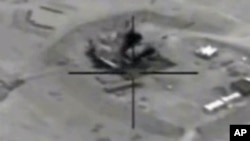Syria’s oil industry, like most of its industries, is in a state of collapse. And even recent gains, according to analysts, won’t come close to bringing it back.
“We have great necessity to have oil production to make the economic wheel go forward,” said Afif Dalla, a political analyst in Damascus, but “I think in general we won’t be able to reproduce the [former levels of] oil production again at the same time of the existence of these terrorist groups.”
As long as the war drags on, he adds, no sector of the Syrian economy will recover fully.
Since the onset of the Syrian war in 2011, government oil production has nearly stopped, with current production estimated at less than three percent of pre-war levels. In recent days, some local authorities have re-opened one of the country’s largest oil fields, more than doubling the country’s small output.
But the move will not come close to rescuing the failed industry, and will mainly serve surrounding villages, according to Mustafa Alani, the director of defense and security at the Gulf Research Center in Dubai.
“It is a local trade and a very primitive way to produce oil,” he explained “Most of the big equipment to be used for this has been destroyed. So I don’t see a change in the situation. It could be a very slight change.”
Even militants that call themselves the Islamic State have reduced illegal production and sales because of air strikes, he said.
More than four years of war in Syria has left more than 200,000 people dead and 12 million people homeless. Syria, once nearly oil independent, Alani says is now almost entirely dependent on imported fuel.
“Syria was almost self-sufficient,” he said. “Now they lost control so they have to import almost every drop, mainly from Iran now.”
Neither the government, nor foreign companies or militant groups are likely to profit from Syria’s oil fields for a long time. If and when the war ends, Syria may be able to produce oil again for its own needs, but the Syrian export industry, he says, may be a thing of the past.
In Damascus, imported fuel is keeping the lights on, according to analyst Dalla, but it’s of little comfort to residents trying to survive a war that involves more than 60 countries, including the coalition against the Islamic State.
“What’s the most important thing in living?” he asked. “It’s to be safe.”





